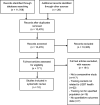Impact of education and training on LGBT-specific health issues for healthcare students and professionals: a systematic review of comparative studies
- PMID: 39773808
- PMCID: PMC11749658
- DOI: 10.1136/bmjopen-2024-090005
Impact of education and training on LGBT-specific health issues for healthcare students and professionals: a systematic review of comparative studies
Abstract
Objectives: Training/education is increasingly used to improve healthcare professionals' knowledge, attitudes and clinical skills about lesbian, gay, bisexual and transgender (LGBT) health, but few reviews have assessed their effectiveness. This review describes the impact of training about LGBT healthcare for healthcare professionals on participants' knowledge, attitudes and clinical practice.
Design: Systematic review of intervention studies with contemporaneous comparators.
Data sources: Medline, CINAHL (Cumulated Index in Nursing and Alllied Health Literature), PsycINFO, Social Sciences Citation Index, Education Resources Information Center, Cochrane Library, University of York CRD, PROSPERO and Ethos e-thesis database were searched from 15/12/2015 to 29/11/2023 to update a review published in 2017.
Eligibility criteria: Interventional studies of training/education for healthcare professionals or students about LGBT-specific health issues, compared with standard or no training/education. Outcomes were changes in participants' knowledge, attitudes or clinical practice regarding LGBT health.
Data extraction and synthesis: Reviewer pairs independently screened titles/abstracts and full texts. Data were extracted by one reviewer and checked by a second (population, training content, development, delivery, duration/intensity and outcomes). The National Institutes of Health tool for controlled intervention studies assessed study quality. Synthesis was descriptive.
Results: 11 734 citations were screened, and 10 studies were included. 8/10 were published since 2019. Study quality was poor (8/10) or fair (2/10), and all were conducted in high-income countries. Four focused on transgender care. All studies used multi-component approaches, with topics covering terminology, lived experience, LGBT-specific health, sexuality and sexual history taking. Training duration ranged from 40 min to 50+ hours. Five studies included LGBT individuals in training development and/or delivery. 7/7 studies assessing attitudes, 2/4 studies assessing knowledge and 4/6 studies assessing skills/practice (actual or intended) reported statistically significant improvements.
Conclusions: Multi-component healthcare professional training on LGBT health can significantly improve participants' knowledge, attitudes and skills. However, there was substantial heterogeneity in training content, delivery and duration, and most studies were of poor quality.
Prospero registration number: CRD42023414431 (26/06/2023).
Keywords: Health Equity; MEDICAL EDUCATION & TRAINING; Sexual and Gender Minorities; Systematic Review.
© Author(s) (or their employer(s)) 2025. Re-use permitted under CC BY-NC. No commercial re-use. See rights and permissions. Published by BMJ Group.
Conflict of interest statement
Competing interests: None declared.
Figures
Similar articles
-
Lesbian, gay, bisexual, and transgender clinical competence of health professionals in Poland and Spain: results of the health exclusion research in Europe (HERE) study.BMC Med Educ. 2025 Jan 29;25(1):144. doi: 10.1186/s12909-025-06744-4. BMC Med Educ. 2025. PMID: 39881315 Free PMC article.
-
Acceptability and Preliminary Efficacy of a Lesbian, Gay, Bisexual, and Transgender-Affirmative Mental Health Practice Training in a Highly Stigmatizing National Context.LGBT Health. 2017 Oct;4(5):360-370. doi: 10.1089/lgbt.2016.0194. Epub 2017 Sep 11. LGBT Health. 2017. PMID: 28891750 Free PMC article.
-
Medical students' knowledge of and attitudes towards LGBT people and their health care needs: Impact of a lecture on LGBT health.PLoS One. 2020 Jul 1;15(7):e0234743. doi: 10.1371/journal.pone.0234743. eCollection 2020. PLoS One. 2020. PMID: 32609754 Free PMC article.
-
Improving Cultural Competence to Reduce Health Disparities [Internet].Rockville (MD): Agency for Healthcare Research and Quality (US); 2016 Mar. Report No.: 16-EHC006-EF. Rockville (MD): Agency for Healthcare Research and Quality (US); 2016 Mar. Report No.: 16-EHC006-EF. PMID: 27148614 Free Books & Documents. Review.
-
Systematic review of Indigenous cultural safety training interventions for healthcare professionals in Australia, Canada, New Zealand and the United States.BMJ Open. 2023 Oct 4;13(10):e073320. doi: 10.1136/bmjopen-2023-073320. BMJ Open. 2023. PMID: 37793931 Free PMC article.
References
-
- Braybrook D, Bristowe K, Timmins L, et al. Communication about sexual orientation and gender between clinicians, LGBT+ people facing serious illness and their significant others: a qualitative interview study of experiences, preferences and recommendations. BMJ Qual Saf. 2023;32:109–20. doi: 10.1136/bmjqs-2022-014792. - DOI - PMC - PubMed
-
- World Health Organization Improving LGBTQ+ health and wellbeing with consideration for SOGIESC. World Health Organization. [28-May-2024]. https://www.who.int/activities/improving-lgbtqi-health-and-well–being-wi... Available. Accessed.
Publication types
MeSH terms
LinkOut - more resources
Full Text Sources

